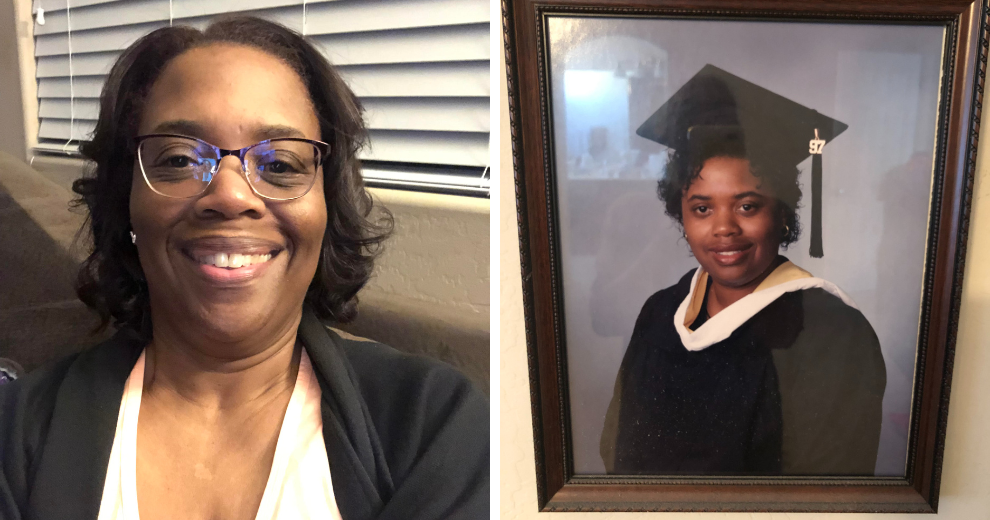When Tanya Burns ’97 landed a dream job as a senior-level human resources partner at Intel, she paused to reflect on her life journey and career.
“I’d worked so hard and overcome so many obstacles to get to that point,” she said. “It was a struggle. There were so many times I didn’t know how I was going to make it.”
Burns had a rocky childhood. She grew up in Roanoke, raised by a single mother who dropped out of high school and worked long hours in a factory to make ends meet.
“It was tough,” said Burns. “I knew that wasn’t the life I wanted to live.”
Burns graduated high school in 1984 and enrolled at James Madison University. But as a first-generation college student in an era where related support services were essentially nonexistent, she felt lost among the 10,000-plus students of the majority-white institution.
“I came from a small, rural high school, so it was overwhelming for me to be thrown into that environment without any real understanding of what it would be like,” said Burns. There was the sprawling campus, survey courses with hundreds of students, educational and knowledge gaps, money problems, and more. She felt confused about “not only what I was doing there, but what I was going to be able to do with my life in general.”

Burns returned to Roanoke within a year and got what was supposed to be a stop-gap job in bank operations. She took a few community college classes hoping they’d spark an interest. Time passed. And in 1988 she found herself pregnant.
“The relationship didn’t last, so now here I was raising a child by myself, working a dead-end job, and living in a city I’d wanted to get away from for as long as I could remember,” said Burns. “I knew that if I didn’t want to end up working in a factory like my mom, that if I was going to give my son the opportunities he deserved, I had to find a way to move forward.”
She approached bank management about promotion tracks and tried to double-down at the community college. But working full-time while raising a small child made it hard to attend traditional classes, much less take a full course-load.
Back then, “online learning didn’t exist; most colleges just weren’t set up to accommodate a working student like me,” said Burns. After it took five years to earn her associates degree, “I realized that my success depended on finding a school that could understand my situation and work with me around my schedule.”
Researching options led Burns to Mary Baldwin’s Adult Degree Program. Established in 1977, it was the first degree track in Virginia — and one of the first on the East Coast — designed specifically to meet the needs of nontraditional learners.
“A light went off and I was like, ‘This is it, this is meant to be!’” Burns said. She enrolled in MBU’s business program in 1995 and quickly developed an interest in human resources.
“It took a lot of work, a lot of late nights and missed sleep, but it was worth it,” said Burns. Professors nurtured and encouraged her to develop leadership skills, think critically and independently, and excel in a fast-paced business environment. When she graduated in 1997 with a near-perfect GPA, her degree “was the first step in opening a door to a new life, to things my mother didn’t have and couldn’t even imagine.”
“As a first-generation college student, earning my degree from Mary Baldwin University opened the door to a new life. Now, I want to pay that gift forward to young people who are in a similar position that I was. ”
Tanya Burns ’97
Since graduating, Burns has held a progression of human resources positions at major U.S. companies like IBM, Avnet, American Airlines, Goodwill, and U.S. Airways. She spent time in Atlanta, but settled in the Southwest, where she earned an MBA from the University of Arizona (UA). She joined Intel as a human resources business partner in 2021.
“At this point I think it’s safe to say I’ve had a successful career — and there’s certainly more of that to come — but to me, my biggest success is my son,” said Burns. He graduated from UA in 2010, is happily married, and works as a marketing manager for national healthcare services provider, Optum. “I was able to break the cycle [of poverty], which is an amazing thing to be able to say.”
That thought stuck with Burns when she discovered Intel matched up to $10,000 in individual employee charitable donations per year.
“I kept thinking about how different our lives would’ve been if I hadn’t stuck with it and finished college,” said Burns. She wanted to pay that gift forward. “I wanted to find a way to help young people who are struggling earn their degree and open the door to changing not just their lives, but the lives of their families for generations to come.”
Burns reached out to Mary Baldwin about opportunities to create a scholarship fund. She worked with the Office of University Advancement to establish the Tanya L. Burns ADP Class of ’97 Endowed Scholarship Fund, which will provide Pell-eligible students from underserved backgrounds with full tuition assistance in perpetuity.
“I want to be a role model and show my son and others that you don’t have to be Bill Gates to give back and make an impact,” Burns said. “You know, do you go and buy the fancy sports car, or do you use that money to totally alter the trajectory of someone’s life for the better?”
For Burns, it’s a no-brainer.
“That’s the message I want to show people, that’s what I want my legacy to be,” she said. “I want to leave this world knowing I helped as many young people in a position like the one I was in to find their way and prosper.”